新PEP六年级英语总复习及练习
人教PEP小学六年级上册英语一至三单元总复习
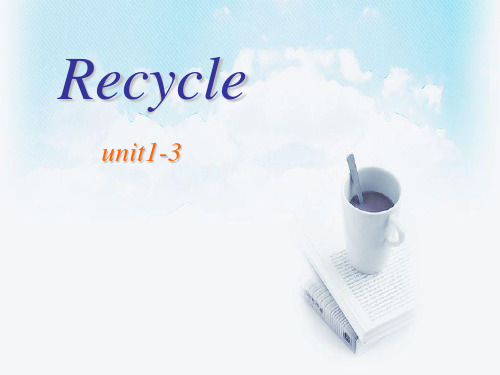
八、读一读,判断正误(10分) There are four people in Mr Black’s family . They’re Mr Black , Mrs. Black , their daughter Amy and their son Sam . Amy has got a bike ,she goes to school by bike . Sam hasn’t got a bike , he goes to school by bus . Mr Black goes to work by car . Mrs. Black is a teacher , and the home is near the school . She goes to work on foot . ( F ) 1. There are five people in the family . ( T ) 2. Amy goes to school by bike . ( F ) 3.Sam goes to school by bike , too . ( F ) 4. Mr Black goes to work by bus . ( F ) 5. Mrs Black isn’t a teacher .
It’s next to the __p_o_s_t_o_ff_i_c_e.
Let’s guess
Where is the__p_o_s_t _o_ff_i_c_e_? It’s next to the __________.
It’s next to the ___s_c_ie_n_c_e__m_u_s_e_u.m
Bye ! Let’s follow the traffic rules!
It’s behind the post office.
PEP六年级英语下册总复习(一般现在时和现在进行时)

六年级英语下册练习(一般现在时和现在进行时复习)一、写出下列单词的第三人称单数。
1. do2. go3. watch4. read5. play6. buy7. study8. fly9. wash 10. live 11. teach 12. come 13. want 14. like 15. have 16. water 17. become 18. look 19. write 20. listen 21. say 22. help 23. make 24. take 25. visit 26. put27. run 28. set 29. empty 30. sweep 31. collect 32. cook 33. jump二、写出下列句子的一般疑问句。
1. They do sports every day .2. Chen Jie does housework every day .3. Mike flies kites every Sunday .4. Miss White teaches us English .5. I have some new stamps .6. I often read books on Sundays .7. He goes to school on foot .8. She likes reading books .9. Mike wants to be a teacher one day .10. My sisters watch TV on the weekends .11. My father goes to work by subway .12. Tom usually plays football after school .13. We make kites on Sundays .14. The cloud comes from the vapour .15. The vapour comes from the water .16. He watches TV every evening .17. I eat dinner at seven .18. I like watching TV .三、写出下列句子的否定句。
人教PEP版六年级英语上册期末复习练习题(含答案)
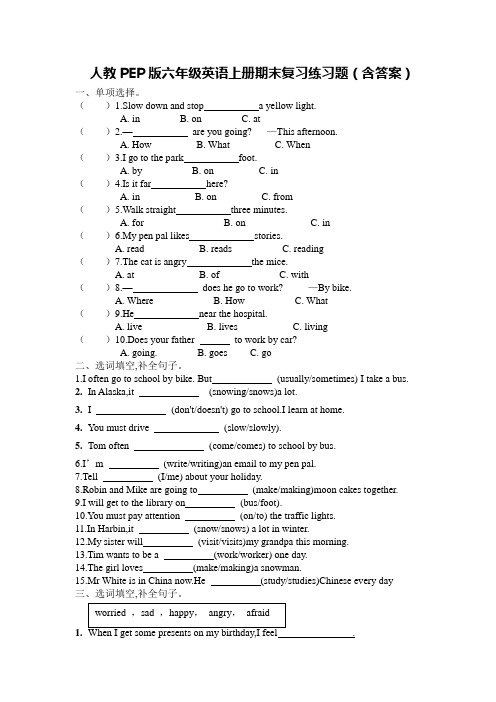
人教PEP版六年级英语上册期末复习练习题(含答案)一、单项选择。
()1.Slow down and stop a yellow light.A. inB. onC. at()2.—are you going? —This afternoon.A. HowB. WhatC. When()3.I go to the park foot.A. byB. onC. in()4.Is it far here?A. inB. onC. from()5.Walk straight three minutes.A. forB. onC. in()6.My pen pal likes stories.A. readB. readsC. reading()7.The cat is angry the mice.A. atB. ofC. with()8.—does he go to work? —By bike.A. WhereB. HowC. What()9.He near the hospital.A. liveB. livesC. living()10.Does your father to work by car?A. going.B. goesC. go二、选词填空,补全句子。
1.I often go to school by bike. But (usually/sometimes) I take a bus.2.In Alaska,it (snowing/snows)a lot.3.I (don't/doesn't) go to school.I learn at home.4.You must drive (slow/slowly).5.Tom often (come/comes) to school by bus.6.I’m (write/writing)an email to my pen pal.7.Tell (I/me) about your holiday.8.Robin and Mike are going to (make/making)moon cakes together.9.I will get to the library on (bus/foot).10.You must pay attention (on/to) the traffic lights.11.In Harbin,it (snow/snows) a lot in winter.12.My sister will (visit/visits)my grandpa this morning.13.Tim wants to be a (work/worker) one day.14.The girl loves (make/making)a snowman.15.Mr White is in China now.He (study/studies)Chinese every day三、选词填空,补全句子。
人教新版新PEP小学六年级英语上册重点知识复习题

义龙试验区佐舍学校六年级英语上册重点学问复习试题姓名:一、英汉互译1.in front of the hospital2.turn left at the post office7.步行8.pay attention to10.traffic lights12.take the No.57 bus13.来学校14.at home17. 去超市19.聚会20.this afternoon21.next week 22.next Wednesday23.half price 24 ic book28.watch TVChinese food 30.climb mountains32.stay healthy34.sports reporter36.in a gym38.take a deep breath39.做更多的运动40.wait for二、按要求完成以下各题1.sad(反义词)2.mouse(复数)3.hear(同音)4.ill〔对应词〕5.good(反义词)6.left(对应词)7.study(第三人称单数) 8.worry(过去式) 9.do(第三人称单数) 10.goes(原型) 11.stories(原型) 12.live(第三人称单数) 13.teach(第三人称单数) 14.dance(-ing形式) (-ing形式) 16.reading(原型) 17.me(主格) 18.he(宾格)19.work〔名词〕__________ 20.write〔名词〕________ 21.singer〔动词〕22.have〔第三人称单数〕_______ 23.they〔宾格〕三、依据提示完成以下各句1.I go to school by_______(自行车).2.My father has a (小轿车).3.Can I go there by (轮船)4.you can take the No.11 (公共汽车).5.Miss Li is going to Beijing_____________(今日下午)6.I’m going to____________________〔买一些单词书〕tomorrow.’re going to have a picnic__________________〔这个周末〕.’m going to visit my aunt_________________________〔今日晚上〕.9.What are you _____________〔爱好〕?10.This is my new _____________〔笔友〕..11.Does she like____________〔唱歌〕. 12.I ________〔居住〕in Shanghai.13.Does your sister go ____________〔远足〕. 14.My father is a____________〔商人〕.15.He is going to be a_____________〔邮递员〕. 16.The__________〔渔民〕works hard.17._________〔在哪儿〕does your father work 18.Li Yu is a___________〔飞行员〕.19.You should______________〔数到十〕. 20.Maybe our cat is chasing a __________〔老鼠〕’s ___________〔有缺点〕.------You father is ill. 22.How do you__________〔觉得〕23.You should take a deep_________〔呼吸〕四、用所给的适当形式填空1.I go to school by bike.But my brother _________〔go〕to school on foot.2.Does your pen pal like_________(draw)pictures3.What about going___________(swim)this afternoon’s (go)together.5.Mr Green_________(live)in Australia.五、连词成句1.a cinema near there is here()2.how I can get the to post office()3.at the school turn right(.)4.a what great museum(!)5.nex to it’s the post office(.)6.go I there bike by(.)7.a light red at stop(.) 8.on can go she there foot()9.must I pay attention the to lights traffic(!)10.on people bike helmets wear must(.)11.are what going you do to tomorrow()12.to have an I am going lesson art(.)13.are going where you this afternoon()14.you when are going()15.going to we are draw pictures weekend this(.)16.right at the turn post office(.) 17.I you can help()18.is to the it next hospital(.) 19.you going what to are do() 20.have do comic books you() 21.hobbies are what your()22.does like dancing she(.) 23.kun fu likes doing he(.)24.live I in Guangzhou(.) 25.I like reading stories also(.)26.your mother what do does() 27.he work does where()28.near my the sea mother works(.) 29.go to he work how does() nt you do be to head a teacher() 31.is the cat with angry them(.)32.this he should see a morning doctor(.) 33.be don’t sad(.)34.is worried very Sarah(.) 35.should I do what() 36.go don’t red at light the(.) 37.good have time a (.)39.science is museum where the(.) 40.today it I send to want(.)六、选词填空to what where why on in next about with for1.What are you going to do_________Monday2.We’re going to draw some pictures_______Renmin Park.3.Let’s go_______a picnic.4.Jack is going to visit me_______week.4.They’re going to see a film_______space travel. 6._________not go on Tuesday7.________are you going to buy 8._________are you going’m going__________see a film this evening.七、依据括号里的提示做题1.You should go to the hospital.(就画线部分提问)2.How does Sarah feel(用happy答复)3.We can go to the zoo today.(变为否认句)4.My mother is a head teacher. (就画线部分提问)your mother do5.My father works near the sea. (就画线部分提问)6.He can go with us.(变为一般疑问句)does your father7.They read some books in the library. (变为否认句) 8.A:Is she cleaning her room(作确定答复)B:9.How can I go to the park( 用by subway答复) 10.You can go on foot. (变为一般疑问句)11.He likes going hiking. (变为一般疑问句) 12.Mike gose to work by car. (就画线部分提问)。
新版PEP六年级英语(上册)复习资料练习题

新六年级上英语期末复习资料Unit 1 单词重点句型:1.I want to buy a postcard. 我想买一张明信片。
(想做某事)2.Where is the science museum? 科学博物馆在哪里?3.It s next to the bookstore. 它在书店旁边^1.1t s next to the park on Dongfang Street. 它在东方大街的公园附近。
5.How can we get there? 我们怎么到达那里?6.Turn left at the bookstore. 至U书店左转。
感叹句:I.What a great museum! 多么宏伟的一座博物馆啊!2.What anjnteresting film! 多么有趣的一部电影啊!Unit 2 单词重点句型:1.How do you come to school? 你怎么来的学校?(go to school 去学校)2.I come to school by bike. 我骑自行车来的学校。
3.How does he go...to...school? 他怎么去的学校?4.He goes to school on foot. 他步行去学校。
5.—How do you get to the USA from China? 你怎么丛中国到美国?一By plane. 乘飞机。
6.Take the No.57 bus over there. 乘那里的57 路公交车。
7.I must. pay attention to the traffic lights. 我必须要注意交通信号灯。
8.The park is over there. 公园就在那里。
9. In the USA people on bikes must wear the helmet. 在美国人们骑自行车必须戴头盔。
10.Don 't go at the red light! 红灯时禁止通行!11.You must look right before you cross the road. 穿过马路时你必须向右看。
新PEP小学英语六年级总复习资料

新PEP小学英语六年级总复习资料小学英语教材所选内容均来源于学生学习及日常生活,为学生所熟悉的。
因此,教师得抓住时机,充分运用教材,从起始年级,培养学生良好的说话的习惯。
小编在这里整理了英语相关知识,快乐看看吧!新PEP小学英语六年级总复习资料一. 反义词big(大的)--- small(小的) black(黑色)---white(白色) free(闲的)---busy(忙的)hot(热)---cold(冷) same(相同的)祝福您及家人身体健康、万事如意、阖家欢乐!祝福同学们快乐成长,能够取得好成绩,为祖国奉献力量!祝福您及家人身体健康、万事如意、阖家欢乐!祝福同学们快乐成长,能够取得好成绩,为祖国奉献力量!---different(不同的) cool(凉爽)---warm(暖和)tall(高的)---short(矮的) long(长的)---short(短的) young(年轻的)---old(老的)here(这里)---there(那里) before(之前)---after(之后) new(新的)---old(旧的)二. 单词归类1.国家(country)China中国 America美国 Australia澳大利亚 Japan日本England英国 Canada加拿大 France法国2.国籍(nationality)Chinese中国人American美国人Australian澳大利亚人Japanese日本人English英国人 Canadian加拿大 French 法国人3.语言(language)Chinese汉语 Japanese日语 English英语 French 法语4.科目(subject)Chinese语文 maths 数学 English 英语 art 美术music音乐 P.E. 体育 computer 电脑 science科学5.星期(week)Sunday星期日 Monday星期一 Tuesday星期二 Wednesday星期三Thursday星期四 Friday星期五 Saturday星期六6.季节(season) spring 春天 summer夏天 autumn秋天 winter 冬天7.月份(month)January一月 February 二 March三月 April四月 May五月 June 六月July 七月August 八月September 九月October 十月November十一月 December十二月8.节日(festival)Spring Festival 春节 Dragon Boat Festival龙舟节 Mid-autumn Festival中秋节New Year’s Day元旦National Day 国庆节Children’s Day儿童节Easter复活节 Halloween万圣节 Christmas 圣诞节Women‘s Day妇女节Teacher’s Day 教师节May Day劳动节9.患病(illness): have a fever发烧hurt疼痛have a cold感冒have a toothache牙疼have a headache头疼have a sore throat喉咙疼10.食物(foods)cake蛋糕 mooncake月饼 dumpling 饺子 bread 面包 pork猪肉fish鱼肉chicken 鸡肉meat肉beef 牛肉egg鸡蛋rice米饭soup汤 salad 沙拉 sandwich三文治 pizza 比萨饼 hamburger 汉堡包 noodles 面条11.时间(time)year年month 月week周date日期day 白天hour 小时morning早上afternoon下午evening晚上yesterday昨天today今天tomorrow明天 next week下个周 last weekend上个周末 last year 去年 the day before yesterday前天 two months ago12.服装(clothes)T-shirt T恤衫 sweater毛衣 coat 大衣 shorts短裤 jeans牛仔裤hat帽子cap帽子 shoe鞋子 sock 短袜 glove 手套scarf 围巾dress连衣裙skirt短裙shirt衬衫13.动物(animals)chicken鸡 duck鸭 goose鹅 dog狗 cat 猫 pig猪 sheep绵羊goat 山羊horse马lion狮子tiger老虎elephant 大象snake蛇kangaroo 袋鼠 monkey 猴子bear 熊 panda熊猫 whale鲸 hen母鸡 mouse老鼠 giraffe长颈鹿 deer鹿14.颜色(colour)grey 灰色 red红色 green绿色 yellow黄色 blue蓝色 white白色 black黑色pink粉红色 orange橙色 brown褐色 purple紫色15.饮料(drinks):juice汁 milk 牛奶 Coke可乐 tea茶 coffee 咖啡 water 水16.数字基数词:one 一 two 二 three三 four四 five五 six 六 seven七eight八 nine 九 ten十 eleven 十一 twelve 十二 thirteen 十三 fifteen 十五 twenty二十thirty 三十 forty 四十 fifty五十 hundred 百 thousand 千 million 百万序数词:first 第一 second第二 third第三 fifth第五 sixth第六seventh第七eighth第八ninth第九twelfth 第十二twentieth 第二十thirtieth第三十17.植物、水果蔬菜tree 树 flower花 grass草 fruit 水果 apple苹果 pear 梨 orange 橙 banana 香蕉 grape葡萄 peach桃子 strawberry草莓watermelon 西瓜pineapple菠萝vegetable蔬菜tomato西红柿potato马铃薯onion洋葱 cabbage卷心菜 green beans豆角18.职业(jobs)worker工人 farmer农民 doctor医生 nurse护士 teacher 教师driver司机 cook厨师 police officer警察 singer歌唱家cleaner清洁工postman邮递员fisherman 渔夫pilot飞行员coach教练businessman商人19、自然界sun太阳 moon月亮 star星星 sky天空 river江河 lake 湖 sea大海 hill山mountain山脉 snow雪 wind风 cloud云 rain雨20、天气(weather)sunny阳光明媚的windy有风的cloudy多云的snowy下雪的rainy下雨的 dry干燥的wet湿的 warm暖的 cool凉爽的 cold冷的 hot热的21、人体部分head头 hair头发 hand手 face脸 eye眼 ear耳朵 nose鼻子 leg 腿 foot脚22、人people人们 man男人 woman妇女 child小孩 grandparents祖父母 parents父母 father父亲 mother母亲 sister姐妹 brother兄弟cousin堂兄 uncle舅舅、叔叔 aunt阿姨23、文具pen钢笔 pencil铅笔 rubber橡皮 ruler尺 knife小刀 map地图dictionary字典24、建筑与房屋部分bedroom卧室living-room客厅kitchen厨房study书房washroom 卫生间 garden花园 office办公室 bank银行 school学校hospital医院cinema电影院park公园zoo动物园shop商店bookstore书店supermarket超市library图书馆museum博物馆post office邮局TV station电视台hotel宾馆wall墙floor 地板window 窗 door门25.日用品lamp台灯 light灯 telephone电话 clock钟 fridge冰箱 cup杯glass玻璃杯 box盒子 bowl碗26.方位词left左 right右 in front of 在前面 behind后面 near附近 next to与相邻27.家具bed床 desk书桌 table桌子 chair椅子 shelf 书架sofa沙发28.餐食meal一顿饭 breakfast早餐 lunch 午餐 dinner晚餐29.交通工具bus公共汽车 train火车 car小汽车 bike自行 ship轮船 boat小船 plane飞机 ferry轮渡 subway地铁 taxi出租车30.外貌tall高的 short矮的 fat胖的 thin 瘦的healthy健康的 nice好看的 beautiful(pretty)美丽的strong强壮的 old 老的 young 年轻的 heavy重的31.性格clever(smart)聪明的active活跃的quiet安静的shy 害羞的hard-working勤奋的strict严厉的kind和蔼的polile 有礼貌的helpful乐于助人的能干的四.动词词组go shopping去购物 go fishing去钓鱼 go boating去划船 go swimming 去游泳go skiing 去滑雪 go skating去溜冰 go for a walk 去散步 go hiking去远足 go on a picnic去野餐 go camping去野营 go to the cinema 去看电影 go to bed去睡觉 go to school去上学 go to work 去上班 go back回来 go out出去play football 踢足球play basketball打篮球play table tennis(play ping-pong)打乒乓球play badminton 打羽毛球 play the piano 弹钢琴 play games 玩游戏 write a letter写信listen to music听音乐 watch TV 看电视 see a film 看电影 take photos(pictures)照相clean the room打扫房间 wash clothes洗衣服 draw a picture 画画 have breakfast 吃早餐 have lunch 吃午餐 have dinner 吃晚饭do housework 做家务do my homework做作业have a Chinese lesson 上语文课take a dancing class上舞蹈课do morning exercises晨练pick apples 摘苹果plant trees种树wait for等候make cakes 做蛋糕 make the bed 铺床make a card 做卡片look for 寻找 put on穿上 wake up醒来 get up 起床五. 介词短语a pair of 一双 a lot of 许多 on the farm在农场 in front of在…前面 in the sky 在空中 on foot步行 in the morning 在早上in the afternoon在下午 in the evening在晚上 at night在晚上 at school 在学校 at home在家六、易错词汇1. a, an的选择: 元音字母开头的单词用an,辅音字母开头的单词用a.2. am , is , are的选择: I 用 am , you 用 are. 第三人称单数用is , 复数都用are.3. have , has 的选择: 表示某人有某物。
PEP小学六年级的英语总总结复习试卷习题
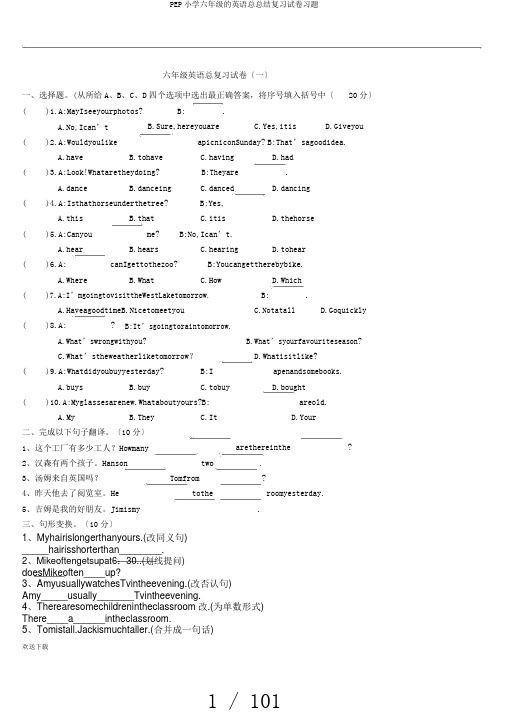
-六年级英语总复习试卷〔一〕一、选择题。
(从所给A、B、C、D四个选项中选出最正确答案,将序号填入括号中〔20分〕()1.A:MayIseeyourphotos?B:.A.No,Ican’tB.Sure,hereyouareC.Yes,itisD.Giveyou ()2.A:Wouldyoulike apicniconSunday?B:That’sagoodidea.A.haveB.tohaveC.havingD.had()3.A:Look!Whataretheydoing?B:Theyare.A.danceB.danceingC.dancedD.dancing()4.A:Isthathorseunderthetree?B:Yes,A.thisB.thatC.itisD.thehorse()5.A:Canyou me?B:No,Ican’t.A.hearB.hearsC.hearingD.tohear()6.A:canIgettothezoo?B:Youcangettherebybike.A.WhereB.WhatC.HowD.Which()7.A:I’mgoingtovisittheWestLaketomorrow.B:.A.HaveagoodtimeB.NicetomeetyouC.NotatallD.Goquickly ()8.A:?B:It’sgoingtoraintomorrow.A.What’swrongwithyou?B.What’syourfavouriteseason?C.What’stheweatherliketomorrow?D.Whatisitlike?()9.A:Whatdidyoubuyyesterday?B:I apenandsomebooks.A.buysB.buyC.tobuyD.bought()10.A:Myglassesarenew.Whataboutyours?B:areold.A.MyB.TheyC.ItD.Your二、完成以下句子翻译。
新PEP六年级英语总复习及练习精选全文完整版

可编辑修改精选全文完整版六年级英语毕业总复习一单词名词动词形容词可数不可数原型进行式过去式第三人称单数原型比较级apple water do doing did does fat fatter(将来时、一般现在时)(一般现在时)单数复数apple apples一、定义:名词可以分为可数名词和不可数名词,不可数名词没有单复数,一律看作单数。
二、可数名词:分为单数和复数⑴单数:以元音音标a e i o u 开头的单数用an(一个),其他用a(一个)或者one +单数复数:some(一些)加复数或者不可数名词;或者大于1的具体数字+复数⑵可数名词单数→复数的变化规则:三、不可数名词:以下词为常为不可数名词,他们的复数形式就是他们本身。
water 水milk牛奶tea 茶rice米饭juice 果汁bread面包meat 肉四、人称代词:be 动词am , is , are的选择: 单数用is , 复数用are,I 用am , you 用are.练习题一、选择a或an或some.pen bag apple big applebananas orange books water二、写出下列各词的复数.watch _______ child _______ day________ foot________ book_______ sheep ______ box_______ peach______ man______fish _______ paper_______三、选择:1、There on the wall .They are very beautiful.A. are photoesB. are photos2、That’s book.A. anB. a3、There some in the river.A. are, fishesB. are ,fish4. Would you like _______ ,please?A. some watersB. some water5、Do you want to drink much ?A、a milkB、milk四、选择be(am is are ) 填空。
【高频考点】人教PEP版六年级英语下册期末总复习-句式改写题(含答案)

人教PEP版(三起)六年级英语期末总复习专项训练【题型】句式改写题一、按要求完成下列句子。
(10分)(1)There is no library now. (改为一般过去时)There ______ no library _______.(2)There were many people in the park. (改为否定句)There ______ ______ people in the park.(3)He eats a cake every day.(用last week替换every day)He ______ a cake last week.(4)两年前我不会骑自行车。
(翻译句子)I ______ ______ my bike two years ______.(5)I had long hair before(改为否定句)I ______ ______ long hair before.二、按要求改写句子。
(10分)(1)You can buy the gift. (改为否定句)_____________________________________________(2)Amy took lots of pictures. (改为一般疑问句)_____________________________________________(3)I went swimming last weekend. (就划线部分提问)_____________________________________________(4)Mike ate fresh food yesterday. (改为一般疑问句)_____________________________________________(5)It was good. (改为否定句)_____________________________________________三、句型转换。
pep六上英语期末复习及练习题
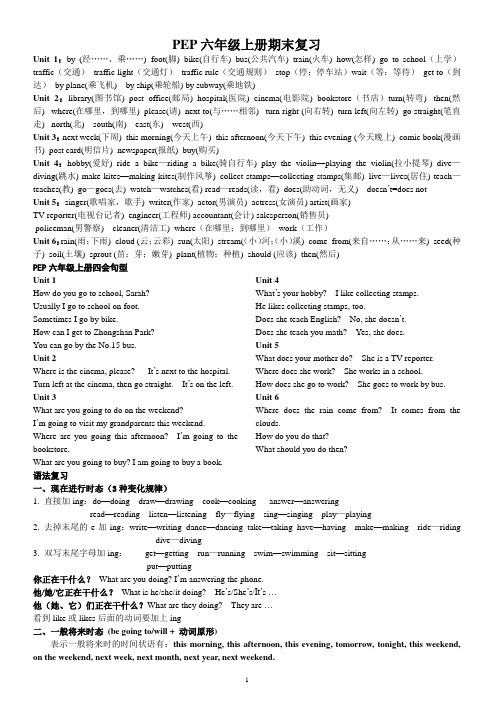
PEP六年级上册期末复习Unit 1:by (经……,乘……) foot(脚) bike(自行车) bus(公共汽车) train(火车) how(怎样) go to school(上学)traffic(交通) traffic light(交通灯) traffic rule(交通规则)stop(停;停车站)wait(等;等待)get to(到达)by plane(乘飞机) by ship(乘轮船) by subway(乘地铁)Unit 2:library(图书馆) post office(邮局) hospital(医院) cinema(电影院) bookstore(书店)turn(转弯) then(然后) where(在哪里,到哪里) please(请) next to(与……相邻) turn right (向右转) turn left(向左转) go straight(笔直走) north(北) south(南) east(东) west(西)Unit 3:next week(下周) this morning(今天上午) this afternoon(今天下午) this evening (今天晚上) comic book(漫画书) post card(明信片) newspaper(报纸) buy(购买)Unit 4:hobby(爱好) ride a bike—riding a bike(骑自行车) play the violin—playing the violin(拉小提琴) dive—diving(跳水) make kites—making kites(制作风筝) collect stamps—collecting stamps(集邮) live—lives(居住) teach—teaches(教) go—goes(去) watch—watches(看) read—reads(读,看) does(助动词,无义) doesn’t=does notUnit 5:singer(歌唱家,歌手) writer(作家) actor(男演员) actress(女演员) artist(画家)TV reporter(电视台记者) engineer(工程师) accountant(会计) salesperson(销售员)policeman(男警察) cleaner(清洁工) where(在哪里;到哪里) work(工作)Unit 6:rain(雨;下雨) cloud (云;云彩) sun(太阳) stream((小)河;(小)溪) come from(来自……;从……来) seed(种子) soil(土壤) sprout (苗;芽;嫩芽) plant(植物;种植) should (应该) then(然后)PEP六年级上册四会句型Unit 1How do you go to school, Sarah?Usually I go to school on foot.Sometimes I go by bike.How can I get to Zhongshan Park?Y ou can go by the No.15 bus.Unit 2Where is the cinema, please? It’s next to the hospital. Turn left at the cinema, then go straight. It’s on the left. Unit 3What are you going to do on the weekend?I’m going to visit my grandparents this weekend.Where are you going this afternoon? I’m going to the bookstore.What are you going to buy? I am going to buy a book. Unit 4What’s your hobby? I like collecting stamps.He likes collecting stamps, too.Does she teach English? No, she doesn’t.Does she teach you math? Y es, she does.Unit 5What does your mother do? She is a TV reporter. Where does she work? She works in a school.How does she go to work? She goes to work by bus. Unit 6Where does the rain come from? It comes from the clouds.How do you do that?What should you do then?语法复习一、现在进行时态(3种变化规律)1. 直接加ing:do—doing draw—drawing cook—cooking answer—answeringread—reading listen—listening fly—flying sing—singing play—playing2. 去掉末尾的e加ing:write—writing dance—dancing take—taking have—having make—making ride—ridingdive—diving3. 双写末尾字母加ing:get—getting run—running swim—swimming sit—sittingput—putting你正在干什么?What are you doing? I’m answering the phone.他/她/它正在干什么?What is he/she/it doing? He’s/She’s/It’s …他(她、它)们正在干什么?What are they doing? They are …看到like或likes后面的动词要加上ing二、一般将来时态(be going to/will + 动词原形)表示一般将来时的时间状语有:this morning, this afternoon, this evening, tomorrow, tonight, this weekend, on the weekend, next week, next month, next year, next weekend.(今晚)你将要做什么?What are you going to do (this evening)?I’m going to the cinema.I’m going to visit my grandparents.你将什么时候去?When are you going?I’m going at 7:10.你将怎样去呢?How are you going?I’m going by bus.今天下午你将要去哪里?Where are you going this afternoon?I’m going to the bookstore.你将要买什么呢?What are you going to buy?I’m going to buy a comic book.你将和谁一起去?Who are you going with?I’m going with my parents.三、第三人称单数后面的动词要加s或es1. 一般情况加s,如:read—reads;live—lives;play—plays;sing—sings2. 动词末尾以s,x,ch,sh或部分以o结尾的加es。
新PEP小学英语六年级上册复习资料
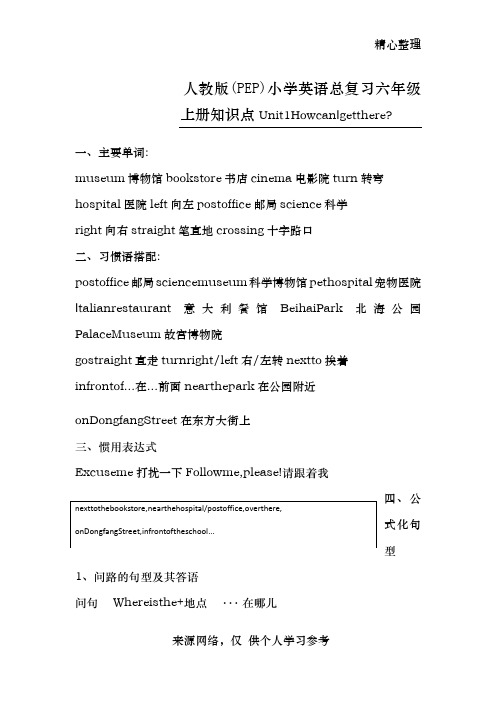
精心整理人教版(PEP)小学英语总复习六年级上册知识点Unit1Howcan I getthere? 一、主要单词:museum 博物馆bookstore 书店cinema 电影院turn 转弯:sciencemuseum talianrestaurantExcuseme 打扰一下 1Whereisthe+nexttothebookstore,nearthehospital/postoffice,overthere,I t’s+表示地点的词语。
它···。
2Howcan+主语+get(to)+the+Canyoutellmethewayto+Whereis+Whichisthewayto+Turn+方向+表示地点的介词短语。
atthecinemaatthecornernearthepostoffice...Whereisthecinema,please?I t’snexttothehospital.它与医院相邻。
Turnleftatthecinema,thengostraight.I t’sontheleft.在电影院向1、Whereisthemuseumshop?博物馆商店在哪里?I t’snearthedoor.他在门附近。
2、Whereisthepostoffice?邮局在哪里?I t’snexttothemuseum.它与博物馆相邻。
3、Whereistherestaurant?餐馆在哪里?I t’snexttothetheparkonDongfangStreet.它与东方街上的公园相邻。
Unit2Waystogotoschoolby乘bus公共汽车onfoot步行plane飞机taxi出租车ship subway地铁train火车slow慢的stop停下always usually通常often经常sometimes有时候never从来不,永不Wait Hooray I see.绿灯行Stopataredlight红灯停Waitatayellowlight1Howdoyoucome(to)+2、如何用must某人+must++.···必须···。
PEP六年级上册英语总复习资料
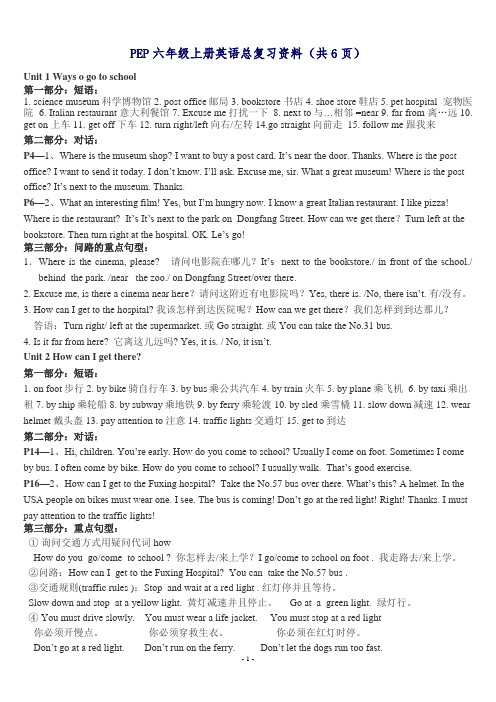
PEP六年级上册英语总复习资料(共6页)Unit 1 Ways o go to school第一部分:短语:1. science museum科学博物馆2. post office邮局 3. bookstore 书店4. shoe store鞋店5. pet hospital 宠物医院 6. Italian restaurant 意大利餐馆 7. Excuse me打扰一下 8. next to与...相邻 =near 9. far from 离 (10)get on 上车11. get off 下车12. turn right/left向右/左转14.go straight向前走 15. follow me 跟我来第二部分:对话:P4—1、Where is the museum shop? I want to buy a post card. It‟s near the door. Thanks. Where is the post office? I want to send it today. I don‟t know. I‟ll ask. Excuse me, sir. What a great museum! Where is the post office? It‟s next to the museum. Thanks.P6—2、Wh at an interesting film! Yes, but I‟m hungry now. I know a great Italian restaurant. I like pizza! Where is the restaurant? It‟s It‟s next to the park on Dongfang Street. How can we get there?Turn left at the bookstore. Then turn right at the hospital. OK. Le‟s go!第三部分:问路的重点句型:1.Where is the cinema, please? 请问电影院在哪儿?It‟s next to the bookstore./ in front of the school./ behind the park. /near the zoo./ on Dongfang Street/over there.2. Excuse me, is there a cinema near here?请问这附近有电影院吗?Yes, there is. /No, there isn‟t.有/没有。
PEP小学六年级英语下册复习语法知识及配套习题
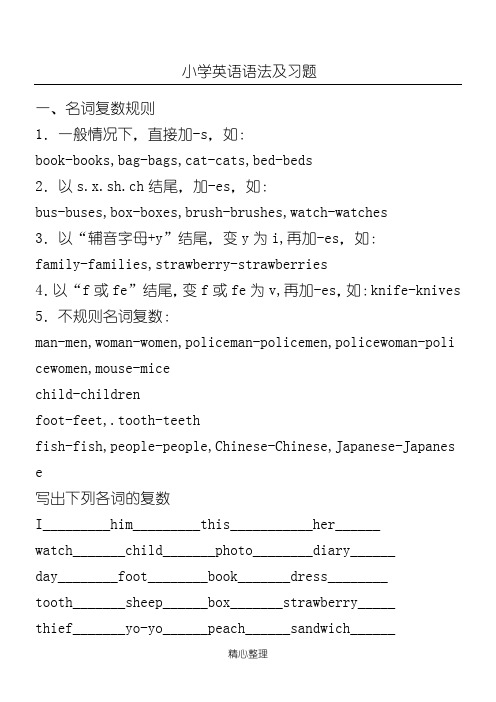
小学英语语法及习题一、名词复数规则1.一般情况下,直接加-s,如:book-books,bag-bags,cat-cats,bed-beds2.以s.x.sh.ch结尾,加-es,如:3.以4.以5eI_________him_________this___________her______ watch_______child_______photo________diary______ day________foot________book_______dress________ tooth_______sheep______box_______strawberry_____ thief_______yo-yo______peach______sandwich______man______woman_______paper_______??????juice___________ water________milk________rice__________tea__________ 二、一般现在时一般现在时基本用法介绍【No.1】一般现在时的功能或"-es"一般现在时的变化1.be动词的变化。
否定句:主语+be+not+其它。
如:Heisnotaworker.他不是工人。
一般疑问句:Be+主语+其它。
如:-Areyouastudent?-Yes.Iam./No,I'mnot.特殊疑问句:疑问词+一般疑问句。
如:Whereismybike?2.行为动词的变化。
否定句:主语+don't(doesn't)+动词原形(+其它)。
如:动词12.以s.x.sh.ch.o结尾,加-es,如:guess-guesses,wash-washes,watch-watches,go-goes3.以“辅音字母+y”结尾,变y为i,再加-es,如:study-studies 一般现在时用法专练:一、写出下列动词的第三人称单数drink________go_______stay________make________look_________have_______pass_______????carry____ come________?????watch______plant_______fly________ study_______brush________do_________????teach_______ 二、用括号内动词的适当形式填空。
新PEP小学英语六年级上册unit4--unit6单元练习题

新PEP⼩学英语六年级上册unit4--unit6单元练习题4单元练习题⼀、听问句选答语。
(5分)( )1.A.Yes, I do B. Yes, he does C. Yes, he can( )2. A.I like playing chess B.I can play football C.I am making kites ( )3.A.By bus B.He likes playing basketball. C.He goes to work at 7:00.( )4.A.He likes Australia B.He comes from the Australia C.He lives in Australia( )5.A.I can plant trees. B.I’m going to plant some trees. C.I’m watering the flowers⼆、听录⾳补全下列句⼦。
(5分)1.My pen pal ____ in ShangHai.2.----How do you go to the park? ----By ________.3.It’s ____ to the bookstore.4.we are going to watch TV _____ ______.5.My hobby is _______ __________.6.---Does he like and . --Yes, he does.7. He lives in Australia, but he .三、按要求完成下列各题。
1.swim(现在分词)_______2.write(现在分词________3.story(复数)______4.here(反义词)_________5.dance(现在分词)_____6.hobby(复数)_________7.go(单三)_______8.watch(单三)_________9.teach(单三)_________ 10.do(单三)__________11.Tom(所有格)________12.Amy(所有格)________13.you(形代)_______14.do(否定词)_________15.does(否定词)________16.let’s(全写)______17.have(单三) _________18.take(现在分词)_________19.drive(名词)___________四、选择题( )1.---___your hobbies? ---I like going hiking and doing word puzzles.A.WhatB.What are C .How( )2.My sister likes______A.play violinB.play the violinC.playing the pipa( )3.Does She_like _____ kung fu. A.do B.doing C.does ( )4.What are ___ hobbies? A.you B.your C.yours( )5.----What are his hobbies? --He likes _____A.playing footballB.play footballC.playing the football( )6.We____like drawing cartoons. A.also B.too C.to ( )7.Chen Jie_____drawing pictures. A.like B.likes C.liking ( )8.Does he____English? A.teach B .teacher C.teaches( )9.---Does she live in Shang Hai? ----______A.Yes,she doesn’tB.No,she doesC.Yes ,she does.( )10.Chen Jie ____in Australia. A.live B.lives C.living ( )11.___your pen pal like Chinese food? A.Does B.Do C.Are ( )12.My sister doesn’t ____going hiking. A.like B.likes C.liking五、句型转换1. his , what., hobbies, are______________________________2.live, he, does, Sydney, in ________________________________3. also, I , like , and, doing kung fu , singing.__________________________4. I, can, be, also, pen pal, his ____________________________5.---________________? ---I like singing and dancing.(补全问句)6.He_____(喜欢)singing.7.I like______________(踢⾜球).9.I like making kites and watching TV.(画线提问)___________________10.I like drawing cartoons.(⽤she改写)____________________________11.I like singing and dancing.(⼀般疑问句及肯定回答)____________________________________________________________ 12.He goes to work by bus.(⼀般疑问句和否定回答)____________________________________________________________ 13.My father teaches English.(⼀般疑问句和否定回答)____________________________________________________________ 14.I can take the No.5 bus.(⼀般问句及肯定回答)____________________________________________________________15.Are you going to buy an English book?(肯否回答)________________16.He likes doing kung fu and swimming.(画线提问)_________________17.What do you like ?( 同义句)______________________________ 18.What does he like ?(同义句)_____________________________六、阅读短⽂判断正(T)误( F)。
PEP小学六年级英语下册复习语法知识及配套习题
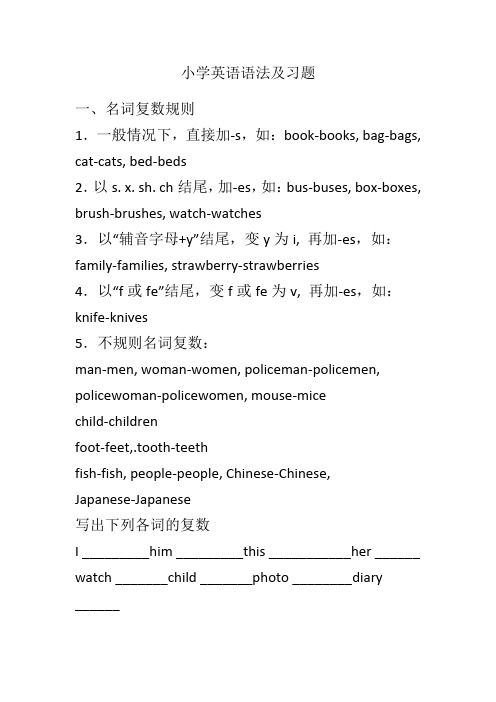
小学英语语法及习题一、名词复数规则1.一般情况下,直接加-s,如:book-books, bag-bags, cat-cats, bed-beds2.以s. x. sh. ch结尾,加-es,如:bus-buses, box-boxes, brush-brushes, watch-watches3.以“辅音字母+y”结尾,变y为i, 再加-es,如:family-families, strawberry-strawberries4.以“f或fe”结尾,变f或fe为v, 再加-es,如:knife-knives5.不规则名词复数:man-men, woman-women, policeman-policemen, policewoman-policewomen, mouse-micechild-childrenfoot-feet,.tooth-teethfish-fish, people-people, Chinese-Chinese,Japanese-Japanese写出下列各词的复数I _________him _________this ___________her ______ watch _______child _______photo ________diary______day________ foot________ book_______ dress________tooth_______ sheep ______box_______ strawberry_____thief _______yo-yo ______ peach______ sandwich______man______ woman_______paper_______ juice___________water________ milk________ rice__________tea__________二、一般现在时一般现在时基本用法介绍【No. 1】一般现在时的功能1.表示事物或人物的特征、状态。
【精选】人教pep版六年级小升初英语总复习《单项选择》专项练习(含答案)

【精选】人教pep版六年级小升初英语总复习《单项选择》专项练习(含答案)单项选择。
名词( )1.—Where are you going this weekend? —I’m going to.A.ShanghaiB.by planeC.yesterday( )2.I like .Because it’s cool.I can fly kites.A.fallB.summerC.winter( )3.Lily is very hungry now.She needs some .A.paperB.waterC.food( )4.—What can you see in the picture? —Five and three .A.woman;catsB.women;catsC.women;cat( )5.We played at ten o’clock in a music lesson.A.pianoB.pianosC.the pianoD.the pianos( )6.My shirt is Size M.It is smaller than Jim’s but bigger than Peter’s.Peter’s shirt is .A.Size L.B.Size M.C.Size S.( )7.—What’s your? —I am a teacher.B.hobbyC.job( )8.I want to send a letter.I can go to the .A.bankB.post officeC.school( )9.My favourite subject is .A.meatB.mathsC.a mouse( )10.Zoom likes .It’s sour.A.watermelonsB.grapesC.orange juice( )11.I am hungry.Let’s go to the .A.parkB.dining roomC.playground( )12.The longest wall in the world is in .A.the USAB.EgyptC.China( )13. is a kind of Western arts.A.Beijing OperaB.BalletC.Chinese painting ( )14.People go to to watch operas and concerts.A.the Golden Gate BridgeB.the Sydney Opera HouseC.the Eiffel Tower( )15.Of all ,I like football best.A.foodB.sportsC.colour( )16.It will rain tomorrow.You should take .A.an umbrellaB.a bookC.a kite( )17.It’s very hot in.A.springB.autumnC.summer( )18.There are two in our school.A.libraryB.some librariesC.libraries( )19.—How many are there on your team? —Twenty.A.playerB.playersC.ball( )20.—What does your uncle do,Tony?—He is a .He works in a gym.A.factory workerB.coachC.postman( )21.On the farm,there are many cows,horses and .A.sheepB.henC.sheeps( )22.I’m from and I’m.A.China;ChineseB.Chinese;ChinaC.Chinese;Chinese ( )23.After class,I sit at my and do my homework.A.bedB.deskC.roomD.chair ( )24.I need a .I’m too hot.A.kiteB.deskC.fan冠词( )1.Wu Yian likes apples,and he has apple every day.A.the;aB.some;anC./;an( )2.Amy can play piano and I can play basketball.A.the;/B./;theC.the;the( )3.I have old jacket. jacket is green.A.an;AnB.the;TheC.an;The( )4.Can I have ice cream,Mom?A.aB.anC.then( )5.I’m good drawing.I want to be artist in the future.A.at;anB.in;anC.at;a( )6.Miss Li is English teacher and Mr Wang is Chinese teacher.A.a;anB.an;aC.an;an( )7.I run for about hour.A.aB.anC./( )8.I can play pipa.A.theB.aC.an( )9.We don’t have glue.Can you give us ,please?A.a;aB.a;someC.any;some( )10.They often play flute after school.A./B.theC.aD.an( )11.We need hour’s exercise a day.A.aB.anC.the( )12.This is egg.That is red bag.A.a;anB.an;/C.an;a代词( )1.—Is this hat? —Yes,the black one is ,too.A.you;myB.yours;mineC.your;mine( )2.Mrs Zhang teaches English.We all like class.A.our;his;herC.we;him( )3.Janet’s brother gave a bag as a present last month.A.sheB.herC.his( )4.—is your maths teacher? —Mr Wang.A.WhoB.WhatC.Where ( )5.—Would you like juice? —Yes,I’d like.A.some;someB.any;someC.some;any ( )6.We think school is beautiful.A.ourC.we ( )7.—Look at the two computers on the shelf. do you like?—I like the black one.A.What’sB.WhoC.Which one ( )8.The book is .A.meB.myC.mine ( )9. bike is this?A.WhoB.WhoseC.What ( )10.Look!The pictures are .They are beautiful.A.mineB.myC.me ( )11.—We didn’t hear you.Can you tell the story for again?—OK.B.weC.her ( )12.My arms are longer than .A.youB.yoursC.your ( )13. country is very beautiful.A.WeB.Our数词( )1.The library is on the floor.A.nineB.nineteenC.ninth ( )2.We should brush our teeth a day.A.twoB.twiceC.every ( )3.Daming is playing the suona for the time.A.thirdB.oneC.two( )4.The teachers’ office is on the floor.A.oneB.twoC.second( )5.We should wash our face a day.A.twoB.secondC.twice( )6.Li Ming goes to school a week.A.five dayB.five daysC.two( )7.—How often do you eat fruit? — a week.A.OneB.TwoC.Once( )8.There are months in a year.A.twentyB.twelfthC.twelve( )9.My grandpa’s birthday is on the of October.A.twelveB.twelfthC.two形容词( )1.Zhang Peng is than Peter.A.short and strongerB.shorter and strongerC.shorter and strong( )2.Mr Sun is than Mr Wind.He wins.A.strongB.strongerC.strongest( )3.The race is and we are .A.exciting;excitingB.excited;excitedC.exciting;excited ( )4.They played computer games for four hours.It is too for their eyes.A.goodB.healthyC.bad( )5.In summer,trees have leaves.A.yellowB.greenC.red( )6.I’m 2 years than Tom.A.olderB.oldC.longer( )7.Mike is an English boy.Chinese is for him.A.difficultB.famousC.easy( )8.You can’t cross the street now.The light is .It’s .A.red;easyB.red;dangerousC.green;safe( )9.My brother is 1.54 metres.I’m 1.6 metres.I’m than him.A.tallerB.shorterC.elder( )10.The apples are .Please wash them.A.dirtyB.cleanC.small( )11.Tom is a very boy.He always smiles and says hello to others.A.poorB.politeC.dirty( )12.Lucy is 42 kg.Kate is 46 kg.So Lucy is than Kate.A.thinnerB.youngerC.fatter( )13.You should drink more milk and coke.A.moreB.a littleC.less( )14.Amy is very in reading storybooks.A.interestingB.interestedC.tired( )15.The tree is than both of together.A.taller;weB.tallest;usC.taller;us( )16.Mom bad fruit and didn’t feel last weekend.A.eat;goodB.eats;badC.ate;well( )17.—was your summer holiday,Yifan? —It was good.A.WhatB.WhenC.HowD.Where( )18.In summer,it is very .A.be hotB.hotC.warm( )19.I wrote many emails yesterday afternoon.I was .A.freeB.busyC.angry( )20.It’s in spring.A.hot and sunnyB.cold and snowyC.warm and rainyD.windy and cloudy( )21.—How are you? —I’m 1.60cm tall.A.oldB.heavyC.tall( )22.—Is Mike than you? —Yes,I’m 2cm than him.A.shorter;shorterB.taller;tallerC.taller;shorter副词( )1.—_______ did you go there? —By bus.A.WhatB.WhoC.How( )2.Danny brushes his teeth after dinner.That’s bad for his teeth.A.alwaysB.oftenC.never( )3.—did you go yesterday? —I went to the shop.A.WhyB.WhatC.Where( )4.I am a good student.I do my homework.A.always B sometimes C.never( )5.—did you go on your holiday? —Shanghai.A.WhatB.WhereC.How( )6.—can I get to the museum,Robin?—Go straight.It’s on your left.A.HowB.WhereC.What( )7.Let’s do the exercise reach up and bend down low.A.highB.lowC.early( )8.It’s good you eat breakfast.A.for;toB.for;forC.to;to( )9.People can cut wood with the saw .A.easilyB.happilyC.easy( )10.Go along this street and you will see the zoo.A.leftB.rightC.straight( )11.—are you so sad? —Because I lost my bag.A.WhenB.WhyC.Where介词( )1.We stay home Sundays.A.at;inB.in;onC.at;on( )2.Go to bed 6 o’clock the evening.A.on;inB.at;inC.at;on( )3.You can see a picture Shanghai on the wall.A.ofB.inC.for( )4.What do you do Sundays?A.atB.onC.in( )5.Let’s make a fac e the snowman.A.underB.onC.of( )6.I go to school bus.A.rideB.atC.by( )7.We don’t go to school those days.A.onB.inC.at( )8.They will get ready school.A.toB.forC.on( )9.What will you do the summer holiday?A.toB.withC.for( )10.People all praised the bee its hard work.A.toB.withC.for( )11.What’s wrong Lucy now?A.withB.atC.from( )12.Fruit is good you.A.forB.atC.with( )13.Go straight ten minutes.Then turn left the hospital.A.for;inB.for;atC.on;at( )14.I often help my sister her homework.A.withB.forC.before( )15.It’s time Chinese class.A.toB.forC.at( )16.John stayed with his grandparents in Canada the winter holiday.A.atB.ofC.during( )17.Children can learn something the stories.A.toB.byC.from( )18.I always play badminton my friends school.A.with;afterB.and;atC.and;before ( )19.There was no library my old school.A.toB.forC.in( )20.Jenny often goes to bed 9:30 night.A.in;atB.at;atC.at;in ( )21.It’s time me go home.A.for;forB.for;toC.to;for( )22.Look! The bag is the desk.A.inB.onC.under ( )23.I’m going to watch more sports TV!A.atB.onC.in( )24.My birthday is spring.It’s April 18th.A.in;inB.in;onC.on;in ( )25.I usually take exercise an hour every day.A.atB.forC.on连词( )1.I like summer I like summer vacation.A.becauseB.butC.or( )2.I live in New York, I am not American.A.andB.becauseC.but ( )3.My father was thin before now he’s strong.A.andB.butC.so( )4.Guangzhou is a big and modern city, it is quite noisy.A.whenB.butC.because ( )5.They’re having a picnic, it starts to rain.A.andB.butC.or( )6.She went to sleep she took off her clothes.A.nextB.thenC.after ( )7.We can’t eat drink in class.A.andB.butC.or( )8.I like table tennis, I can’t play it well.A.andB.butC.so动词( )1.Sarah likes computers and she can very quickly.ing;typee;typeing;types( )2.Mike only a car before,but now he two.A.had;hadB.had;hasC.has;had( )3.—What did you do in the sea yesterday? —.A.I studied EnglishB.I swam in the seaC.I went shopping( )4.He often his homework after school.A.doB.didC.does( )5.Look,the children are crossing the road.We must them.A.look outB.look forC.look out for( )6.The police will us lost things.A.help;findB.help;foundC.helps;find( )7.Tom never to turn off the lights when he leaves the classroom.A.forgetB.forgetsC.forgot( )8.You are ill.You must the medicine.A.eatB.makeC.take( )9.—What your mother do? —She is a cook.A.doesB.didC.do( )10.She often her clothes on Sundays,but shecycling last Sunday.A.washes;wentB.wash;goC.washed;goes( )11.He can English songs well.A.singB.singsC.singing( )12.We the trumpet to play it.A.blowB.strumC.beat( )13.Janet often to school early in the morning,but she to school late thismorning.A.goes;goesB.goes;wentC.went;went ( )14.Tom often TV after school.A.watchB.watchingC.watches( )15.Your father is ill.He should .A.take a deep breathB.do more exerciseC.see a doctor ( )16.She likes to music.A.listensB.listenC.listening( )17.Helen a headache and she tired.A.have;isB.have;areC.has;isD.have;has ( )18.I like summer best because I go water skiing.A.canB.can’tC.do( )19.I taught him the ball.A.to hitB.hitC.hitting( )20.—What do you want ? —A cola,please.A.to eatB.drinkC.to drink( )21.—When will the film ? —At 5:00.A.closesB.beginC.answer( )22.I like to kites.I kites yesterday.A.fly;flyB.flew;flyC.fly;flewD.fly;flys ( )23.I have a new bag.Zhang Peng a new bag,too.A.haveB.hasC.am( )24.Tom is too heavy now.He should .A.eat much oily foodB.take a restC.take more exercise ( )25.We’re all good friends,so we all our gifts.A.bringB.giveC.share( )26.There are so many people in the shop.You must your things.A.look atB.look afterC.put awayD.put on ( )27.He wanted me the door.A.openB.to openC.opens( )28. is exercise.A.MondayB.Walking to schoolC.SpringThere be句型( )1.There no trees behind the house before.A.wereB.wasC.are( )2.—Is there a big tree in our school? —.A.Yes,there isB.No,it isn’tC.Yes,it is ( )3.There many people there three days ago.A.wasB.wereC.are( )4.There three shops in the street.A.isB.areC.was( )5.Are there tall buildings in the city?A.aB.someC.any( )6.There a new film tomorrow.A.beB.wasC.will be ( )7.There a girl and two boys in the classroom.A.isB.areC.be( )8.There some milk in the bottle.A.beB.areC.is( )9.There a maths book on the chair.A.amB.isC.are( )10.There two books,a bag on the desk.A.haveB.areC.is( )11.There no gym in my school ten years ago.A.wasB.wereC.are( )12.There no computer rooms in my school twenty years ago.A.isB.wasC.were( )13.There some big trees in our school six years ago.A.areB.wasC.were( )14.There no computers the Internet twenty years ago.A.were;orB.weren’t;orC.were;and( )15.There a river before.A.isB.areC.was感叹句( ).1. a wonderful dream!A.WhoB.WhatC.When( )2. beautiful the flowers are!A.WhatB.HowC.What a( )3. beautiful flowers!A.WhatB.HowC.Whose( )4. a mess!A.WhatB.HowC.Why( )5. dirty the table is!Let’s clean it up.A.How aB.What aC.How祈使句( )1.Good luck the future.A.forB.toC.with( )2.—What does this sign mean(意思)? —It means “”.A.turn rightB.d on’t turn rightC.turn left( )3.—I’m goin g to run the 100 metres on the sports day. —!A.Good luckB.Thank youC.You’re welcome ( )4.Let’s.A.to do homeworkB.do homeworkC.doing homework ( )5. your umbrella.It’s raining outside.A.BringB.TryC.Take( )6.L et’s a party for her.A.haveB.hasC.had( )7.Keep on Chinese in the UK.A.practisingB.practiseC.practised( )8.means“”.A.don’t smokeB.don’t shoutC.don’t step on the grass ( )9.Don’t forget breakfast!A.haveB.hasC.to have一般现在时( )1.Jenny often her mother.A.helpsB.helpC.helped( )2.He breakfast every week.A.haveB.hasC.had( )3.I often my mom at home.A.clean the roomB.take care ofC.wash the clothes ( )4.Jane’s mother in a factory.A.workB.worksC.worked( )5.Every child a nice dream.A.haveB.hasC.had( )6.My brother always in the morning.A.read booksB.reads booksC.rides bikes( )7.Peter often his homework at four o’clock.A.doB.doingC.does( )8.Every morning,Peter at six.A.gets upB.got upC.get up( )9.My sister usually TV in the evening,but yesterday she TV in the morning.A.watched;watchB.watches;watchedC.watch;watching ( )10.Mike usually TV on Saturday.A.watchesB.watchedC.watch( )11.Before breakfast,he his hands and his teeth.A.wash;brushB.washes;brushC.washes;brushesD.wash;brushes( )12.Mike his clothes every day.A.washB.washesC.washed ( )13.My parents TV at seven o’clock every evening.A.watchesB.watchingC.watch现在进行时( )1.—What are they about? —Mike’s old pictures.A.talkB.to talkC.talking( )2.I’m a letter now.A.writingB.writeC.writes( )3.Look!He an email to his family.A.sendB.is sendingC.sent ( )4.In the photo,the wind is .A.shiningB.fallingC.blowing ( )5.I fishing yesterday,but I’m homework now.A.went;doingB.went;didC.go;do( )6.—Look!What is John doing? —.A.He washed his clothesB.She washed her clothesC.He is washing his clothes( )7.—Look!What is she doing? —She TV.A.watchedB.watchesC.is watching ( )8.Sam is the Suona,but the bell rings.A.playB.playsC.playing ( )9.The girl is a red dress.A.wearB.wearingC.wears( )10.—Come and look at John’s old photos!—Wow! He a horse and he is cool.A.is ridingB.was ridingC.ride( )11.Listen!The girl in the classroom.A.singsB.is singingC.is going to sing ( )12.—What’s your brother doing now? —He is his bike.A.cleanB.cleanedC.cleaning( )13.Look!The sun is .Let’s to the park today.A.shining;goesB.shineing;goC.shining;go( )14.In this picture,the boy is a bike.A.readingB.ridingC.reads一般过去时( )1.—What you do last weekend? —I my room.A.does;cleansB.did;cleanedC.did;clean( )2.—Did you a bike yesterday? —No,I .A.rode;didn’tB.ride;didn’tC.ride;don’t( )3.I a bike yesterday.A.rodeB.rideC.riding( )4.We didn’t all night.A.sleptB.sleepC.sleeping( )5.—What did you do last weekend? —.A.I stay at home and read a bookB.I’m staying at home and reading a bookC.1 stayed at home and read a book( )6.The day before yesterday I a new magazine.A.readB.readedC.watched( )7.Liu Tao football yesterday.A.playsB.playedC.play( )8.How did you there?A.getB.get toC.to( )9.We went to a shop.Li Ming a T-shirt today.A.buyB.buysC.bought( )10.I Beijing with my family yesterday.A.go toB.went toC.went( )11.I didn’t camping with my parents but I some gifts for them.A.went;boughtB.go;buyC.go;bought( )12.We on the beach last week.A.playB.playedC.plays( )13.They ice-skated and a snowman in their holiday.A.madeB.makesC.making( )14.She to the shop and bought some fruit.A.goB.goesC.went( )15.—Did you have breakfast this morning? —Yes, .A.I doB.I have some breadC.I had some milk and bread( )16. they fun in Shanghai last week?A.did;haveB.Did;haveC.Do;have( )17.It a terrible day yesterday.A.wasB.wereC.is( )18.Kim me play basketball yesterday.A.teach;toB.taught;toC.taught;of( )19.John didn’t,but he yesterday.A.went camping;saw a filmB.goes hiking;went fishingC.go boating;rode a bike( )20.—Did you a film last weekend? —No,I .A.saw;didB.see;didn’tC.saw;didn’t( )21.My art teacher a beautiful picture last night.A.drawB.drewC.drawed一般将来时( )1.—What are you to do today? —I’m going TV.A.go;to see.B.to go;watchC.going;to watch ( )2.—Will you swim in the sea? —.A.No,I will not.B.No,I didn’t.C.No,I’m not.( )3.I’m going to buy an English book .A.every dayB.nowC.next weekst Sunday ( )4.My cousin is soon.A.leavesB.leavingC.left( )5.My father tomorrow.A.is going to read booksB.reads booksC.read books ( )6.I’m going home next week.A.getting ready toB.get ready forC.getting ready forD.get ready to( )7.Danny and Jenny the game this evening.A.is watchingB.watchesC.will watch ( )8.What are you going to do ?A.next weekendst SundayC.now( )9.I’m going to Hong Kong .A.this afternoonst monthC.yesterday ( )10.We are going to to Shanghai next month.A.wentB.go on a tripC.travels ( )11.I to Xinjiang next week.A.am goingB.wentC.go( )12.We are going Disneyland during the summer holiday.A.visitB.to visitC.visiting ( )13.The boy is going to with his good friends.A.takes a tripB.took a tripC.take a trip ( )14.In the future,our city different.A.areB.will beC.is( )15.I my grandpa by train next month.A.visitB.are visitingC.will visit ( )16.—Tomorrow will be sunny and warm. —Sounds great.A.Let’s have a picnic!B.What will you do?C.Are you OK? ( )17.I busy now,but I free next week.A.am;willB.am;will beC.being;will be ( )18.It will snow in Shenyang.A.isB.beC./( )19.We are going to an email to our teacher.A.sendB.sentC.sending ( )20.We’ll always friends.I will miss you.A.beB.areC.to be ( )21.We have a football match tomorrow.A.are goingB.are go toC.are going to参考答案名词1—5 AACBC 6—10 CCBBC 11—15 BCBBB 16—20 ACCBB 21—24 AABC冠词1—5 CACBA 6—10 BBACB 11—12 BC代词1—5 CBBAA 6—10 ACCBA 11—13 ABB数词1—5 CBACC 6—9 BCCB形容词1—5 BBCCB 6—10 AABAA 11—15 BACBC 16—20 CCBBC 21—22 CC副词1—5 CCCAB 6—11 AAAACB介词1—5 CBABC 6—10 CABCC 11—15 AABAB 16—20 CCACB 21—25 BCBBB连词1—5 ACBBB 6—8 CCB动词1—5 ABBCC 6—10 ABCAA 11—15 AABCC 16—20 CCAAC 21—25 BCBCC 26—28 BBB There be 句型1—5 AABBC 6—10 CACBB 11—15 ACCAC感叹句1—5 BBAAC祈使句1—5 ABABC 6—9 AAAC一般现在时1—5 ABBBB 6—10 BCABA 11—13 CBC现在进行时1—5 CABCA 6—10 CCCBA 11—14 BCCB 一般过去时1—5 BBABC 6—10 ABACB 11—15 CBACC 16—21 BABCBB一般将来时1—5 CACBA 6—10 CCAAB 11—15 ABCBC 16—21 ABCAAC。
六年级英语语法总复习课堂用练习题答案
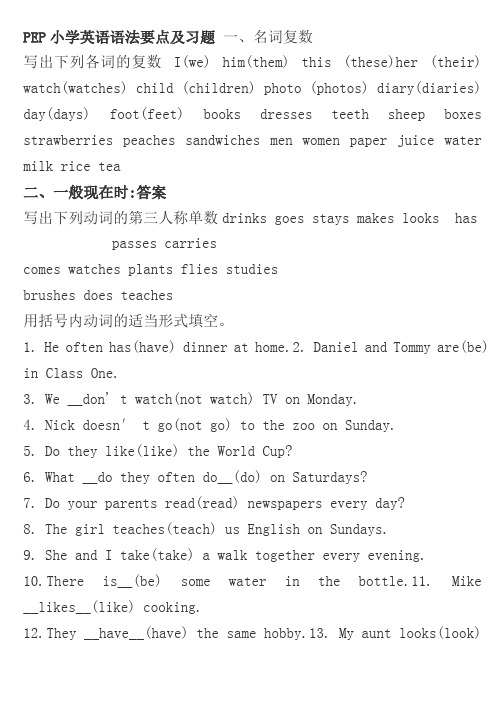
PEP小学英语语法要点及习题一、名词复数写出下列各词的复数I(we) him(them) this (these)her (their) watch(watches) child (children) photo (photos) diary(diaries) day(days) foot(feet) books dresses teeth sheep boxes strawberries peaches sandwiches men women paper juice water milk rice tea二、一般现在时:答案写出下列动词的第三人称单数drinks goes stays makes looks has passes carriescomes watches plants flies studiesbrushes does teaches用括号内动词的适当形式填空。
1. He often has(have) dinner at home.2. Daniel and Tommy are(be) in Class One.3.We __don' t watch(not watch) TV on Monday.4.Nick doesn′ t go(not go) to the zoo on Sunday.5.Do they like(like) the World Cup?6.What __do they often do__(do) on Saturdays?7.Do your parents read(read) newspapers every day?8.The girl teaches(teach) us English on Sundays.9.She and I take(take) a walk together every evening.10.T here is__(be) some water in the bottle.11. Mike __likes__(like) cooking.12.T hey __have__(have) the same hobby.13. My aunt looks(look)after her baby carefully.14.Y ou always __do(do) your homework well.15. I am__(be) ill. I'm staying in bed.16.S he goes(go) to school from Monday to Friday.17. Liu Tao __does_(do) not like PE.18.T he child often watches(watch) TV in the evening.19.S u Hai and Su Yang __have__(have) eight lessons this term.20.—What day is__(be) it today?— It's Saturday.按照要求改写句子1.Daniel doesn' t watch TV every evening.2.Do you do your homework every day? Yes, I do.3.Does she like milk? Yes, she does.4.Does Amy like playing computer games? No, she doesn' t.5.We don' t go to school every morning.6.He doesn' t speak English very well.7.What do you like in the park.8.John comes from Canada.(对划线部分提问)9.She is always a good student. 改为一般疑问句,作否定回答)10.S imon and Daniel like going skating.(改为否定句) 改错(划出错误的地方,将正确的写在横线上)English?_________________ 2.Does he likes going fishing?_________________ 3.He likes play games after class._________________ 4.Mr. Wu teachs us English._________________ 5. She don't do her homework on Sundays.二、现在进行时:写出下列动词的现在分词:play ___ run _____ s wim _____ m akego like write ski read __ have_ sing __ dance_ __ put __ __ see __ __ buy ___ ___ lovelive take come get stop sitbegin shop用所给的动词的正确形式填空:1 .The boy( draw)a picture now.2 . Listen . Some girls( sing)in the classroom .3 . My mother( cook )some nice food now.4 . What you( do ) now?5 . Look . They( have) an English lesson .6 .They(not , water) the flowers now.1. Is your brother speak7.Look! the girls(dance )in the classroom .8.What is our granddaughter doing? She (listen ) tomusic.9. It's 5 o'clock now. We (have)supper now10.Helen(wash )clothes? Yes ,she is .句型转换:1.They are doing housework .(分别改成一般疑问句和否定句)2.The students are cleaning the classroom .(改一般疑问句并作肯定和否定回答)3.I’m playing the football in the playground .(对划线部分进行提问)4. Tom is reading books in his study .(对划线部分进行提问)四、一般将来时:填空。
- 1、下载文档前请自行甄别文档内容的完整性,平台不提供额外的编辑、内容补充、找答案等附加服务。
- 2、"仅部分预览"的文档,不可在线预览部分如存在完整性等问题,可反馈申请退款(可完整预览的文档不适用该条件!)。
- 3、如文档侵犯您的权益,请联系客服反馈,我们会尽快为您处理(人工客服工作时间:9:00-18:30)。
新P E P六年级英语总复习及练习TTA standardization office【TTA 5AB- TTAK 08- TTA 2C】复习一单词名词动词 形容词可数 不可数 原型 进行式 过去式 第三人称单数 原型 比较级 apple water do doing did does fat fatter(将来时、一般现在时) (一般现在时)单数 apple apples一、定义:名词可以分为可数名词和不可数名词,不可数名词没有单复数,一律看作单数。
二、可数名词:分为单数和复数⑴ 单数: 以元音音标a e i o u 开头的单数用an (一个),其他用a (一个)或者one +单数复数:some (一些)加复数或者不可数名词;或者大于1的具体数字+复数。
⑵可数名词单数→复数的变化规则:三、不可数名词:练习题一、选择a或an或some.pen bag apple big apple?bananas orange books water二、写出下列各词的复数.watch _______ child _______ day________ foot________ book_______sheep ______ box_______ peach______ man______ fish _______ paper_______三、选择:1、There on the wall .They are very beautiful. A. are photoes B.are photos2、That’s book. A. an B. a3、There some in the river. A. are, fishes B. are ,fish4. Would you like _______ ,please? A. some waters B. somewater5、Do you want to drink much ? A、a milk B、milk四、选择be(am is are ) 填空。
1、I ____ a boy.2、She ____ my sister.3、You ____ a student.4、He _____ my father.5、It _____ a dog.6、We _____ good friends.7、They _____ happy.复习二一、形容词定义:一般来说,中文意思是“……的”的词是形容词,而中文意思是“……地”的词是副词。
形容词是用来修饰物体的形状,大小,长度,属性,特点等,位于名词的前面。
二、形容词原形变比较级规则:三、不规则变化的形容词:good(原形) - better(比较级) - best(最高级)bad (原形) - worse(比较级) - worst(最高级)四、句型:1. A is 比较级 than B. Eg: Bob is taller than John.2.A is 比较级。
Eg: Bob is taller.3.Who is taller/older/heavier.....than you?Mike is taller/older/heavier.....than me.4. That’s the tallest dinosaur in this hall.练习一、写出下列形容词的比较级,然后写出翻译。
low strong youngtall old shortlong heavy thinsmall big smart二、根据句意填入单词的正确形式。
1.My brother is two years _________ (old) than me.2. Who is __________ (thin),you or Helen Helen is.3.My eyes are __________(big) than hers.4.Who gets up ________ (early),Tim or Tom5.Jim runs _____ (slow) than Ben.6. Which is ___________(heavy), a tiger , a lion?7. Who jumps ________(high ) , a kangaroo or a monkey8. Is a fish _________(thin) than a bird9. A r ose tree isn’t _______( short ) than a pear tree .10. Which is _______( big ), a dinosaur or a blue whale11. My brother is much _______(tall ) than my cousin .三、选择填空。
()1. The yellow shoes are than the blue ones.B. expensiverC. more expensive ()2. A cow is bigger than a mouse.()3. Who’s the ,Jean,Joan or Jennet?()4. Tim is than Jack.funny()5. I’m taller than others in my ’m .tallest ()6. Who can sing better Rose?C./ ()7. I have books than you have.()8. His uncle’s house is very .()9. My bike is ,but his bike is .,new ,newer ,newest ( ) 10. I’m than you.A. strongB. thinC. thinner复习三句子陈述句疑问句肯定句否定句一般疑问句特殊疑问句I like you. I don’t like you. Do you like me一、翻译 what ___ who ___ where ___ whose ___ why ___ when ___ which ___ how ___ how many ___ how much ___ how tall ___ h ow long ___ how old ___ how heavy ___二、选词填空1、A: _______ is the boy in blue? B:He’s Mike.2、A: _______ wallet is it? B:It’s mine.3、A: _______ is the diary? B:It’s under the chair.4、A: _______ is the Chirstmas Day? B: It’s on the 25th of December.5、A: _______ are the earphones? B:They are 25 yuan.6、A: _______ is the hairdryer? B:It’s blue.7、A: _______ is it today? B:It’s Sunday.8、A: _______ was it yesterday? B: It was the 13th of October.9、A: _______ this red one? B:It’s beautiful.10、A: _______ are you fromB:I am from ChongQing.11、A: _______ season do you like best B:Winter.12、A:_______ one is fatter, the blue one or the red one? B: The blue one.13、A:_______ is your brother B: He’s 15 years old.14、A:_______ do you have dinner? B: At 6 o’clock.复习四小学阶段一共学了四种时态,分别是:一般现在时,一般将来时,现在进行时,一般过去时。
1、一般现在时表示现在的习惯动作,即指现在经常发生的动作,一般现在时常用来表示现在时间里某种动作的经常性和习惯性。
它常与表示程度或频度的词连用,如:often(经常) , usually(通常,一般) , sometimes(有时) , always(总是,一直) .一般现在时的功能(1).表示事物或人物的特征、状态。
如:The sky is blue.天空是蓝色的。
(2)表示经常性或习惯性的动作。
如:I get up at six every day.我每天六点起床。
(3).表示客观现实。
如:The earth goes around the sun.地球绕着太阳转。
一般现在时的构成(1). be动词:主语+be(am, is, are)+其它。
如:I am a boy.我是一个男孩。
(2).行为动词:主语+行为动词(+其它)。
如:We study English.我们学习英语。
当主语为第三人称单数(he, she, it)时,要在动词后加"-s"或"-es"。
如:Mary likes Chinese.玛丽喜欢汉语。
一般现在时的变化(1). be动词的变化。
否定句:主语+ be + not +其它。
如:He is not a worker.他不是工人。
一般疑问句:Be +主语+其它。
如:-Are you a student-Yes. I am. / No, I'm not.特殊疑问句:疑问词+一般疑问句。
如:Where is my bike?(2).行为动词的变化。
否定句:主语+ don't( doesn't ) +动词原形(+其它)。
如:I don't like bread.当主语为第三人称单数时,要用doesn't构成否定句。
如:He doesn't often play.一般疑问句:Do( Does ) +主语+动词原形+其它。
如:- Do you often play football-Yes, I do. / No, I don't.当主语为第三人称单数时,要用does构成一般疑问句。
如:- Does she go to work by bike-Yes, she does. / No, she doesn't.特殊疑问句:疑问词+一般疑问句。
